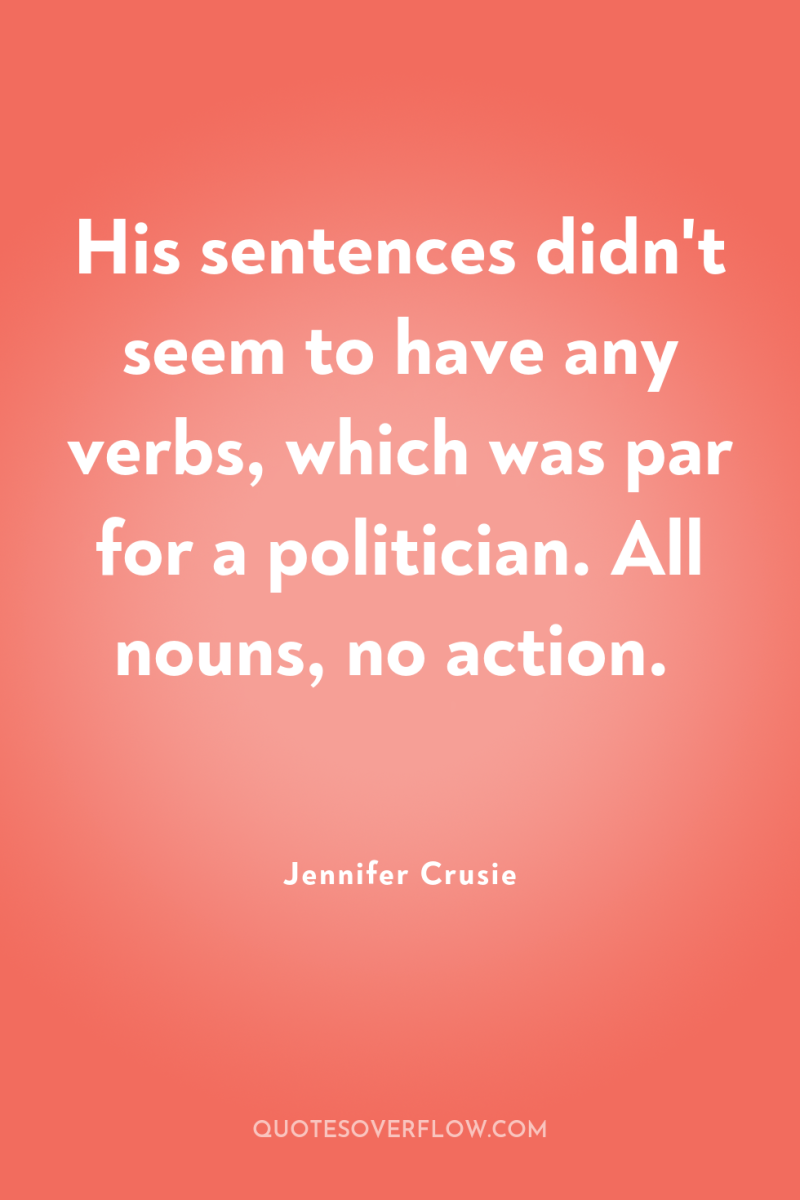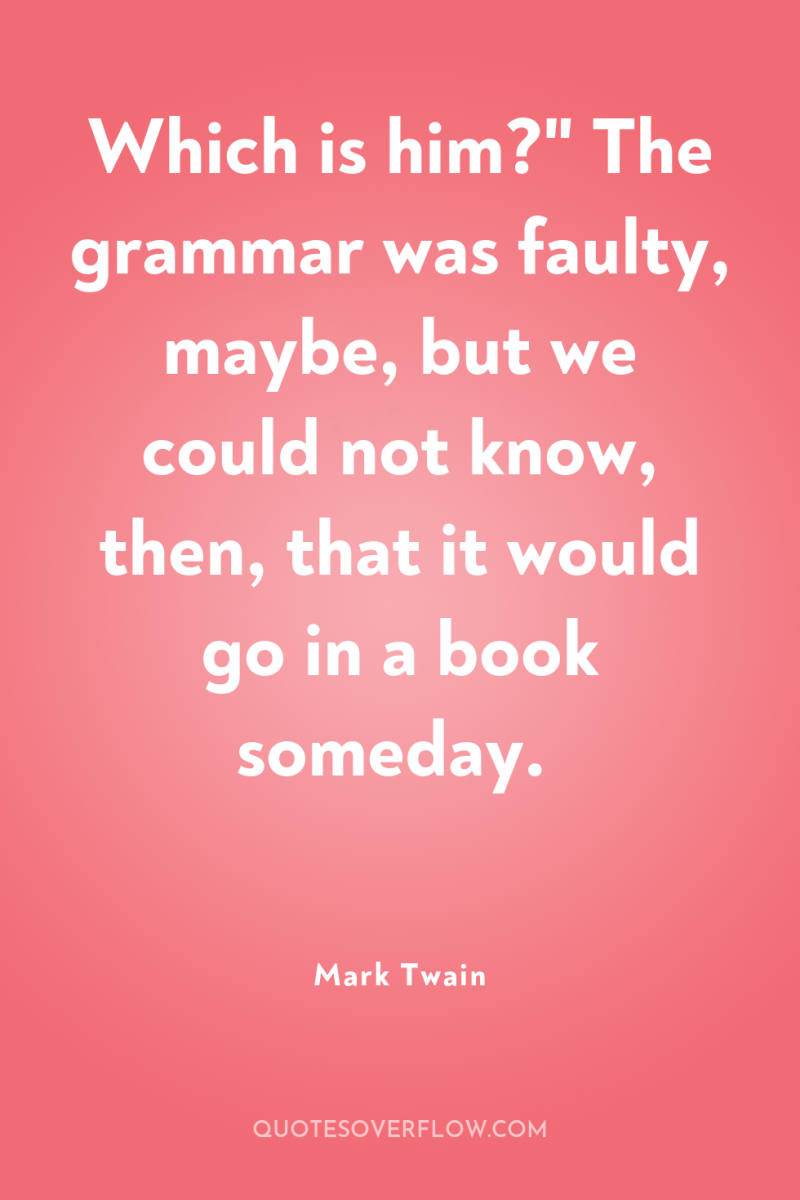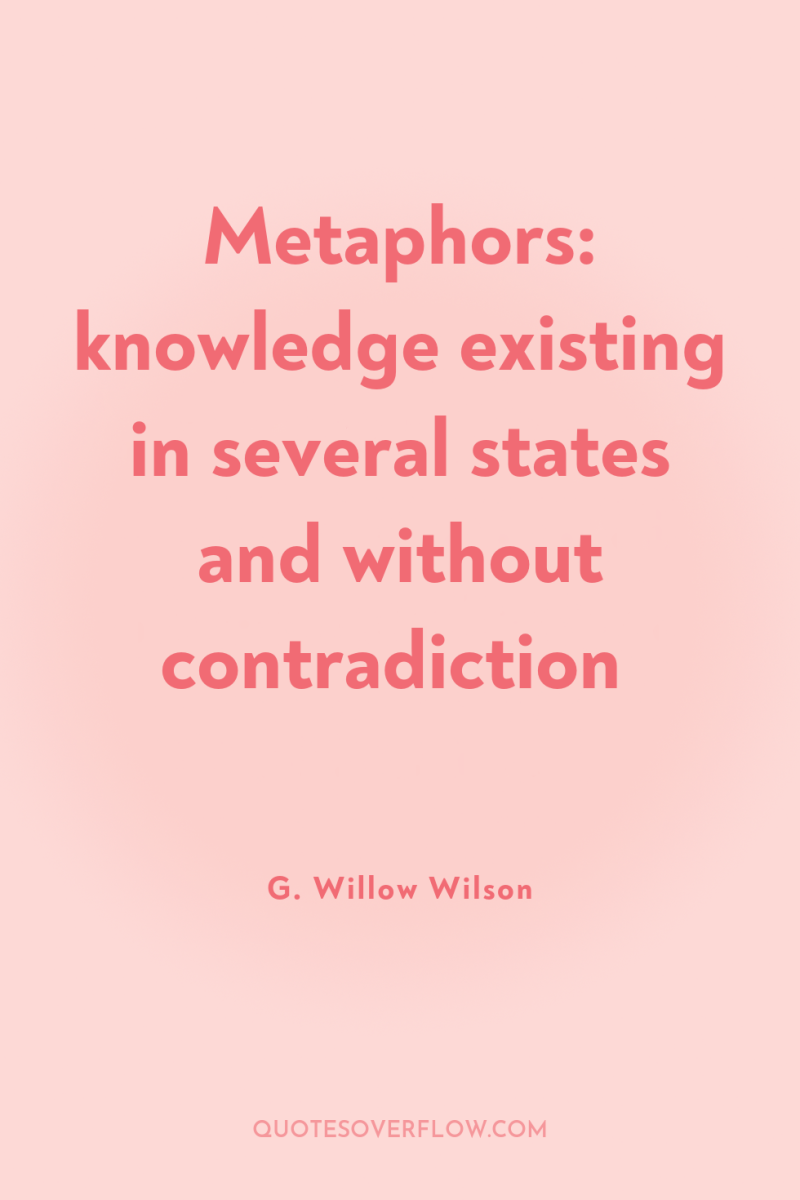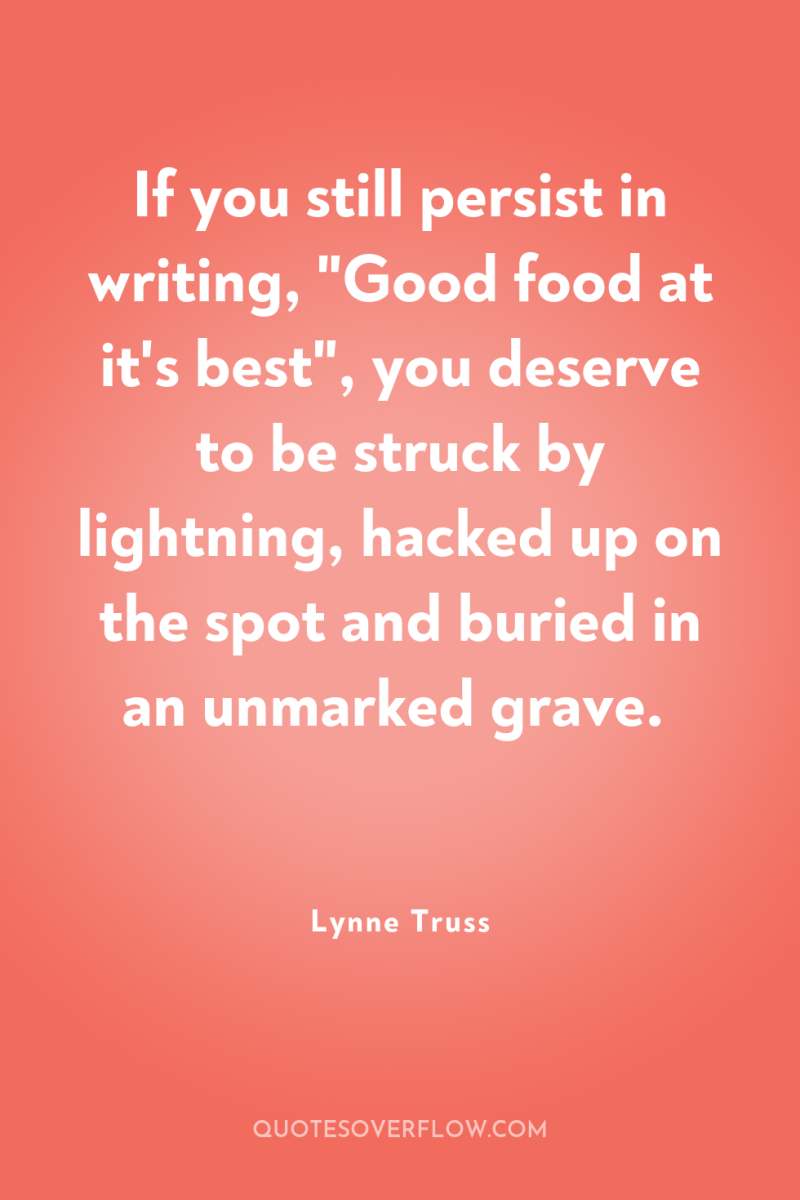1
It is very useful, when one is young, to learn the difference between "literally" and "figuratively." If something happens literally, it actually happens; if something happens figuratively, it feels like it is happening. If you are literally jumping for joy, for instance, it means you are leaping in the air because you are very happy. If you are figuratively jumping for joy, it means you are so happy that you could jump for joy, but are saving your energy for other matters.Lemony Snicket

2
His sentences didn't seem to have any verbs, which was par for a politician. All nouns, no action.Jennifer Crusie
3
One of the major problems encountered in time travel is not that of becoming your own father or mother. There is no problem in becoming your own father or mother that a broad-minded and well-adjusted family can't cope with. There is no problem with changing the course of history–the course of history does not change because it all fits together like a jigsaw. All the important changes have happened before the things they were supposed to change and it all sorts itself out in the end. The major problem is simply one of grammar, and the main work to consult in this matter is Dr. Dan Streetmentioner's Time Traveler's Handbook of 1001 Tense Formations. It will tell you, for instance, how to describe something that was about to happen to you in the past before you avoided it by time-jumping forward two days in order to avoid it. The event will be descibed differently according to whether you are talking about it from the standpoint of your own natural time, from a time in the further future, or a time in the further past and is futher complicated by the possibility of conducting conversations while you are actually traveling from one time to another with the intention of becoming your own mother or father. Most readers get as far as the Future Semiconditionally Modified Subinverted Plagal Past Subjunctive Intentional before giving up; and in fact in later aditions of the book all pages beyond this point have been left blank to save on printing costs. The Hitchhiker's Guide to the Galaxy skips lightly over this tangle of academic abstraction, pausing only to note that the term "Future Perfect" has been abandoned since it was discovered not to be. .Douglas Adams
4
Man, wow, there's so many things to do, so many things to write! How to even begin to get it all down and without modified restraints and all hung-up on like literary inhibitions and grammatical fears...Jack Kerouac
5
Not long ago, I advertised for perverse rules of grammar, along the lines of "Remember to never split an infinitive" and "The passive voice should never be used." The notion of making a mistake while laying down rules ("Thimk, " "We Never Make Misteaks") is highly unoriginal, and it turns out that English teachers have been circulating lists of fumblerules for years. As owner of the world's largest collection, and with thanks to scores of readers, let me pass along a bunch of these never-say-neverisms:* Avoid run-on sentences they are hard to read. * Don't use no double negatives.* Use the semicolon properly, always use it where it is appropriate; and never where it isn't.* Reserve the apostrophe for it's proper use and omit it when its not needed.* Do not put statements in the negative form.* Verbs has to agree with their subjects.* No sentence fragments.* Proofread carefully to see if you any words out.* Avoid commas, that are not necessary.* If you reread your work, you will find on rereading that a great deal of repetition can be avoided by rereading and editing.* A writer must not shift your point of view.* Eschew dialect, irregardless.* And don't start a sentence with a conjunction.* Don't overuse exclamation marks! ! ! * Place pronouns as close as possible, especially in long sentences, as of 10 or more words, to their antecedents.* Writers should always hyphenate between syllables and avoid un-necessary hyph-ens.* Write all adverbial forms correct.* Don't use contractions in formal writing.* Writing carefully, dangling participles must be avoided.* It is incumbent on us to avoid archaisms.* If any word is improper at the end of a sentence, a linking verb is.* Steer clear of incorrect forms of verbs that have snuck in the language.* Take the bull by the hand and avoid mixed metaphors.* Avoid trendy locutions that sound flaky.* Never, ever use repetitive redundancies.* Everyone should be careful to use a singular pronoun with singular nouns in their writing.* If I've told you once, I've told you a thousand times, resist hyperbole.* Also, avoid awkward or affected alliteration.* Don't string too many prepositional phrases together unless you are walking through the valley of the shadow of death.* Always pick on the correct idiom.* "Avoid overuse of 'quotation "marks."'"* The adverb always follows the verb.* Last but not least, avoid cliches like the plague; seek viable alternatives.", November 4, 1979; later also published in book form) .William Safire

6
Which is him?" The grammar was faulty, maybe, but we could not know, then, that it would go in a book someday.Mark Twain
7
It never ceases to amaze me how prosaic, pedestrian, unimaginative people can persistently pontificate about classical grammatical structure as though it's fucking rocket science. These must be the same people who hate Picasso, because he couldn't keep the paint inside the lines and the colors never matched the numbers.Abbe Diaz

8
I can't think why fancy religions should have such a ghastly effect on one's grammar. It's a kind of intellectual rot that sets in, I'm afraid.Dorothy L. Sayers

9
Metaphors: knowledge existing in several states and without contradictionG. Willow Wilson
10
She whispers in my ear: ‘"Tell me that you wan' fuck me hard, make me sweat." In the excitement, she misses out a word. "I want to fuck you so hard that your body drips with sweat, " I say, grammatically.Joe Dunthorne

11
If you still persist in writing, "Good food at it's best", you deserve to be struck by lightning, hacked up on the spot and buried in an unmarked grave.Lynne Truss

12
People who start a sentence with personally (and they're always women) ought to be thrown to the lions. It's a repulsive habit.Georgette Heyer
13
The academic bias against subjectivity not only forces our students to write poorly ("It is believed..., " instead of, "I believe..."), it deforms their thinking about themselves and their world. In a single stroke, we delude our students into believing that bad prose turns opinions into facts and we alienate them from their own inner lives.Parker J. Palmer
14
It is only in grammar that the mighty can be bound by rules made by the humbleAgona Apell
15
Cynthia had been on friendly terms with an eccentric librarian called Porlock who in the last years of his dusty life had been engaged in examining old books for miraculous misprints such as the substitution of "1" for the second "h" in the word "hither." Contrary to Cynthia, he cared nothing for the thrill of obscure predictions; all he sought was the freak itself, the chance that mimics choice, the flaw that looks like a flower; and Cynthia, a much more perverse amateur of misshapen or illicitly connected words, puns, logogriphs, and so on, had helped the poor crank to pursue a quest that in the light of the example she cited struck me as statistically insane. ("The Vane Sisters") .Vladimir Nabokov
16
It was my first-year Latin teacher in high school who made me who made me discover I'd fallen in love with it (grammar). It took Latin to thrust me into bona fide alliance with words in their true meaning. Learning Latin fed my love for words upon words in continuation and modification, and the beautiful, sober, accretion of a sentence. I could see the achieved sentence finally standing there, as real, intact, and built to stay as the Mississippi State Capitol at the top of my street. .Eudora Welty
17
If the components of the body were organs and veins and cells, then the components of thought and language were words and grammar.John Burnside
18
Love and translation look alike in their grammar. To love someone implies transforming their words into ours. Making an effort to understand the other person and, inevitably, to misinterpret them. To construct a precarious language together.Unknown
19
Nothing could go wrong because nothing had... I meant "nothing would." No - Then I quit trying to phrase it, realizing that if time travel ever became widespread, English grammar was going to have to add a whole new set of tenses to describe reflexive situations - conjugations that would make the French literary tenses and the Latin historical tenses look simple.Robert A. Heinlein
20
We got through all of Genesis and part of Exodus before I left. One of the main things I was taught from this was not to begin a sentence with And. I pointed out that most sentences in the Bible began with And, but I was told that English had changed since the time of King James. In that case, I argued, why make us read the Bible? But it was in vain. Robert Graves was very keen on the symbolism and mysticism in the Bible at that time.Stephen Hawking
21
Not long ago, I advertised for perverse rules of grammar, along the lines of "Remember to never split an infinitive" and "The passive voice should never be used." The notion of making a mistake while laying down rules ("Thimk, " "We Never Make Misteaks") is highly unoriginal, and it turns out that English teachers have been circulating lists of fumblerules for years. As owner of the world's largest collection, and with thanks to scores of readers, let me pass along a bunch of these never-say-neverisms:* Avoid run-on sentences they are hard to read. * Don't use no double negatives.* Use the semicolon properly, always use it where it is appropriate; and never where it isn't.* Reserve the apostrophe for it's proper use and omit it when its not needed.* Do not put statements in the negative form.* Verbs has to agree with their subjects.* No sentence fragments.* Proofread carefully to see if you any words out.* Avoid commas, that are not necessary.* If you reread your work, you will find on rereading that a great deal of repetition can be avoided by rereading and editing.* A writer must not shift your point of view.* Eschew dialect, irregardless.* And don't start a sentence with a conjunction.* Don't overuse exclamation marks! ! ! * Place pronouns as close as possible, especially in long sentences, as of 10 or more words, to their antecedents.* Writers should always hyphenate between syllables and avoid un-necessary hyph-ens.* Write all adverbial forms correct.* Don't use contractions in formal writing.* Writing carefully, dangling participles must be avoided.* It is incumbent on us to avoid archaisms.* If any word is improper at the end of a sentence, a linking verb is.* Steer clear of incorrect forms of verbs that have snuck in the language.* Take the bull by the hand and avoid mixed metaphors.* Avoid trendy locutions that sound flaky.* Never, ever use repetitive redundancies.* Everyone should be careful to use a singular pronoun with singular nouns in their writing.* If I've told you once, I've told you a thousand times, resist hyperbole.* Also, avoid awkward or affected alliteration.* Don't string too many prepositional phrases together unless you are walking through the valley of the shadow of death.* Always pick on the correct idiom.* "Avoid overuse of 'quotation "marks."'"* The adverb always follows the verb.* Last but not least, avoid cliches like the plague; seek viable alternat .William Safire
22
A misspelled word is probably an alias for some desperate call for aid, which is bound to fail.Ben Marcus
23
Like prepositional phrases, certain structural arrangements in English are much more important than the small bones of grammar in its most technical sense. It really wouldn't matter much if we started dropping the s from our plurals. Lots of words get along without it anyway, and in most cases context would be enough to indicate number. Even the distinction between singular and plural verb forms is just as much a polite convention as an essential element of meaning. But the structures, things like passives and prepositional phrases, constitute, among other things, an implicit system of moral philosophy, a view of the world and its presumed meanings, and their misuse therefore often betrays an attitude or value that the user might like to disavow.Richard Mitchell
24
Carmen's speciality is national news, and her greatest pleasure is finding inconsistencies in the declarations of politicians: syntactical errors, and — why not? — howlers. The one she has the most fun with is the mayor. Someone who can't speak shouldn't be in charge of a city, she's always saying. And, far from being elitist, her observation alludes to the obvious contempt a certain affluent social class — from which the mayor hails — feels for language (words, meaning, syntax, conjugation, use of prepositions, solipsisms) and which she, a secondary-teacher of language and literature for more than thirty years, refuses to countenance. .Unknown
25
Then you should say what you mean, " the March Hare went on." I do, " Alice hastily replied; "at least-at least I mean what I say-that's the same thing, you know."" Not the same thing a bit! " said the Hatter. "Why, you might just as well say that 'I see what I eat' is the same thing as 'I eat what I see'! "" You might just as well say, " added the March Hare, "that 'I like what I get' is the same thing as 'I get what I like'! "" You might just as well say, " added the Dormouse, which seemed to be talking in its sleep, "that 'I breathe when I sleep' is the same thing as 'I sleep when I breathe'! "" It is the same thing with you." said the Hatter, .Lewis Carroll
26
Grammarians make no new thoughts, but thoughts make new grammar.Dagobert D. Runes
27
The best grammarian still can't write a verse.Dagobert D. Runes
28
Some minds, at some point, discover that they can not make sense of their own predications without attention to grammar, although they do not ordinarily think of what they are doing as an exercise in grammar.Richard Mitchell
29
Perfect grammar--persistent, continuous, sustained--is the fourth dimension, so to speak: many have sought it, but none has found it.Mark Twain
30
Grammar is like a strive for perfection. It's useless really.S. Khemka
31
A man's grammar, like Caesar's wife, should not only be pure, but above suspicion of impurity.Edgar Allan Poe
32
... Likewise, Oscar Wilde asked an English journalist to look over 'The Picture of Dorian Gray' before publication: "Will you also look after my 'wills' and 'shalls' in proof. I am Celtic in my use of these words, not English." Wilde's novel upset virtually every code of late Victorian respectability, but he had to get his modal auxiliaries just right.Andrew Elfenbein
33
Try - Takes the infinitive: "try to mend it, " not "try and mend it." Students of the language will argue that 'try and' has won through and become idiom. Indeed it has, and it is relaxed and acceptable. But 'try to' is precise, and when you are writing formal prose, try and write 'try to.William Strunk Jr.
34
The flesh of prose gets its shape and strength from the bones of grammar.Constance Hale
35
Grammar is a piano I play by ear. All I know about grammar is its power.Joan Didion